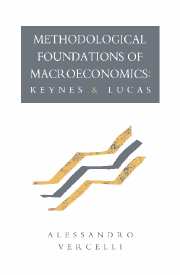Book contents
- Frontmatter
- Contents
- Preface
- List of abbreviations
- 1 Introduction
- Part 1 Methodological foundations of macroeconomics
- 2 Equilibrium, disequilibrium and economic theory
- 3 Dynamic instability and economic models
- 4 Structural instability and economic change
- 5 Uncertainty, predictability and flexibility
- 6 Rationality and expectations
- 7 Probabilistic causality and economic analysis: Suppes, Keynes, Granger
- Part II Keynes after Lucas
- References
- Subject index
- Author index
6 - Rationality and expectations
Published online by Cambridge University Press: 05 January 2012
- Frontmatter
- Contents
- Preface
- List of abbreviations
- 1 Introduction
- Part 1 Methodological foundations of macroeconomics
- 2 Equilibrium, disequilibrium and economic theory
- 3 Dynamic instability and economic models
- 4 Structural instability and economic change
- 5 Uncertainty, predictability and flexibility
- 6 Rationality and expectations
- 7 Probabilistic causality and economic analysis: Suppes, Keynes, Granger
- Part II Keynes after Lucas
- References
- Subject index
- Author index
Summary
It is demonstrable, said Master Pangloss, that things cannot be otherwise than they are; for as all things have been created for some end, they must necessarily be created for the best end. Observe, for instance, the nose is formed to bear spectacles, therefore we wear spectacles. The legs are visibly designed for stockings, accordingly we wear stockings … swine were created to be eaten, therefore we eat pork all the year round. It is not enough therefore to say that every thing is right, we should say every thing is in the best state it possibly could be.
(Voltaire, Candide, 1759, p. 3)Introduction
Besides equilibrium and stability there is a third crucial property which helps to confer some order on the vagaries of economic phenomena: rationality. No one denies that economic behaviour may be irrational, although there are different opinions on the actual impact of irrational drives on economic behaviour. But most economists agree that, at this stage of our knowledge, economic analysis should focus primarily on rational behaviour. This is in any case a necessary benchmark for understanding economic behaviour, even when it deviates from rationality. From this point of view, there is not such a big chasm dividing Keynesian economics from classical economics (old and new). Though Keynesian economists are more prone to allow for irrational elements (like money illusion, animal spirits, shifts in long-term expectations, etc.), most of them prefer to restrict the analysis to rational behaviour. For the sake of comparison, I will thus limit my analysis in both cases to patterns of behaviour which are rational or amenable to some concept of rationality.
- Type
- Chapter
- Information
- Methodological Foundations of MacroeconomicsKeynes and Lucas, pp. 91 - 105Publisher: Cambridge University PressPrint publication year: 1991



